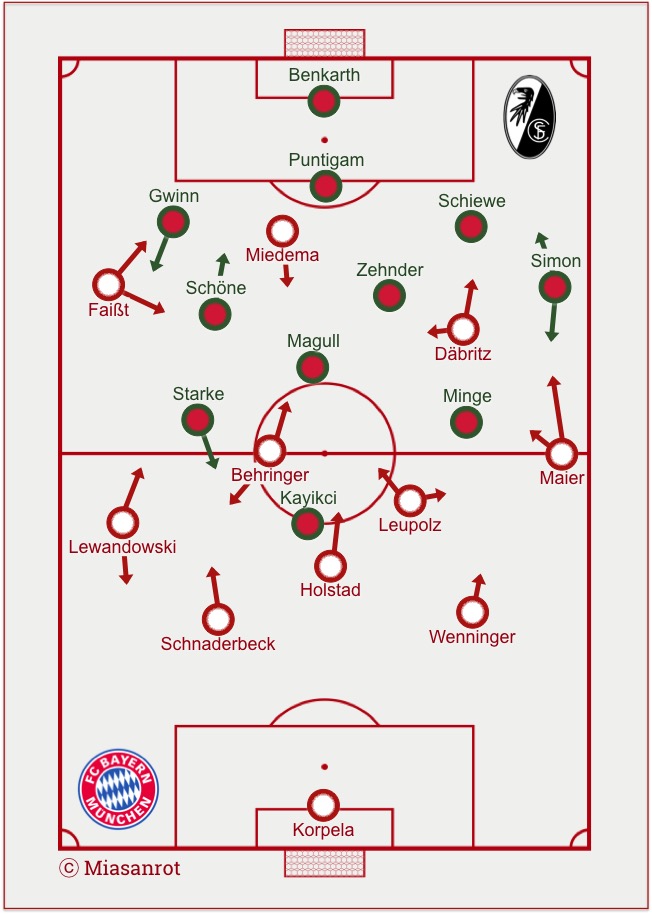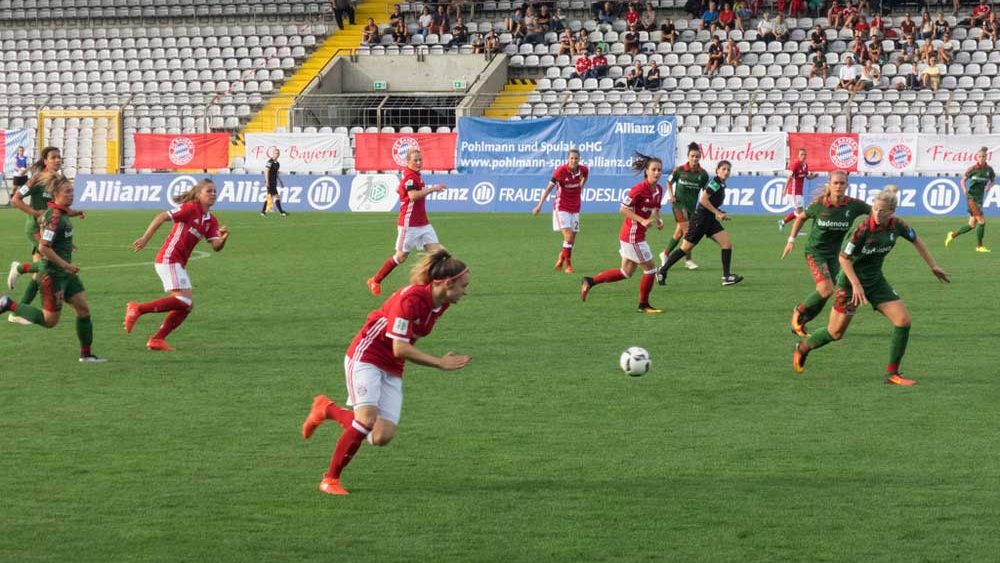Season start: Bayern Women – SC Freiburg 1:1 (0:0)
Bayern started into the new season with a home game against SC Freiburg and didn’t manage to get more than a draw. It could have turned into the perfect opportunity for VfL Wolfsburg, but the Wolves, too, left their game against SC Sand with no more than one point. Winner of matchday one was 1. FFC Frankfurt, who destroyed newly-promoted team Borussia Mönchengladbach 8-0, leading to yet another spot at the top for the team. But the cards will get reshuffled this weekend, with Bayern playing in Jena against their former Kathrin Längert, and Turbine Potsdam and Frankfurt facing off in the live-televise top game. Wolfsburg will host Bayer 04 Leverkusen.
Scotland in the Champions League
There seem to be certain geographical trends in this year’s Champions League: the French teams are going to Norway – Paris to Lillestrøm, and title holders Lyon to Avaldsnes – while the German teams are off across the Channel. Chelsea faces last year’s finalists Wolfsburg once more, after dropping out of the competition against them in the round of 16 last season. And although Chelsea won the English double of cup and league, their weaker UEFA coefficient meant they weren’t set as a group head and now have another chance to get revenge against Kellermann’s team. Bayern’s opponent is Hibernian FC from Edinburgh, Scotland, Lisa Evan’s home.
Brief excursion to the national team
Steffi Jones has succeeded Silvia Neid as Germany’s head coach and announced the squad for the Euro qualifiers against Russia (16/09) and Hungary (20/09). The recent Olympic champions got a break, so that the only Bayern players are new signing Verena Faißt and Leonie Maier. Instead, three newcomers will get a chance: Linda Dallmann and Jacqueline Klasen from SGS Essen, and Hasret Kayikci (SC Freiburg). Even so, Jones’ team should win comfortably, with their current statistics painting an obvious picture: 6 games, 6 wins, 30-0 goals. The Russians even got a 12-0 beating last year. The European competition likely won’t become truly interesting until the actual tournament begins.
Back to Bayern’s opening game against SC Freiburg
It can be difficult to be served a talented, well-led team like SC Freiburg right at the beginning of the season – especially since the Olympic tournament gave Bayern very little time to work on their automatisms with the entire squad. The guests tried to gain possession of the ball – and respect – via strong pressing from the get-go. And yet, Bayern managed to get the first chances under their belt, though that died down after the first five minutes and penalty area action became scarce. Both teams lacked solutions to make it into their opponents’ penalty box with any danger. Leonie Maier’s diagonal dribbling to serve Melanie Behringer was an exception.
Bayern controlled the game with comparatively little possession, by closing down the centre and allowed Freiburg to circulate the ball through their defence. When Bayern tried to press early on, with Sara Däbritz supporting Vivianne Miedema up-front, the guests’ goalkeeper Laura Benkarth played long, high balls. When Bayern drew back a little, Lina Magull tried to support build-up by dropping back from central offensive midfield back into a more defensive position. However, both teams lacked speed and / or precision to find solutions to get past their opponent, with both teams moving smartly across the field.
FC Bayern – SC Freiburg, basic formations
After a good half-hour, Bayern started rotating positions in offence a little: Verena Faißt, who looked strong on the left wing, demanding balls, and showing plenty of presence and drive, moved more into the centre, Däbritz moved further up the field, and Miedema dropped back a little and filled the left offensive space. This caused Bayern’s game to focus even more on the centre, whereas Faißt and Maier had previously had good scenes on the wings.
Although Bayern was slowly taking over control, a goal didn’t seem imminent. And yet, Gina Lewandowski could have become the match winner twice shortly before the half-time whistle: first she hit the ball over the cross-bar after a nice body turn (42′), and a minute later, Benkarth seemed to be beaten and on her knees after a beautiful combination between Miedema, Schnaderbeck, and Lewandowski, but Lewandowski merely hit the outside of the net. It was still 0-0 when the half-time whistle came.
 FC Bayern München Frauen – SC Freiburg, starting formations
FC Bayern München Frauen – SC Freiburg, starting formationsThe game probably could have gone on like this for a long time, but the rhythm changed after Melanie Behringer scored a penalty to make it 1-0 after Däbritz had been brought down during one of her many good moves in the penalty box. Freiburg realised that they couldn’t get fewer points than what they currently had, and started taking more risks; which sped up the game and led to more space for Bayern. A great save from Benkarth stopped Faißt from scoring the 2-0 (53′), and Holstad could have netted a horizontal ball after a long Behringer free-kick towards the far post shortly afterwards. Carina Wenninger only just missed in minute 65. Ten minutes later, Miedema only hit the outside net after controlling a long ball and putting herself in a good scoring position through a clever body spin.
During this strong phase, at last, Bayern should have determined their win, but they didn’t and got punished for that right away. At first, they seemed to have gotten lucky when a duel between Holstad and Carolin Simon in Bayern’s box didn’t lead to a penalty. But shortly afterwards, the home team’s defense was caught unaware: a Freiburg pass seemed to end up behind the goal line, but subbed-in Lena Petermann chased after it, Holstad couldn’t stop her from making the cross, Kayikci headed it in, and Freiburg equalised (78′).
Bayern tried to fight it once more, but during the hectic final minutes, it was mostly Freiburg who were dangerous: Petermann got a long-distance shot right on to Korpela’s goal (86′), and substitute Jobina Lahr managed to get into the penalty box after a counterattack, since no Bayern player wanted to risk a card for foulin in midfield (87′). There were no more goals. Based on chances alone, the game could have gone either way, with the draw a fair result; although it lost like Bayern lost two points, while Freiburg won one.
3 Things We Noticed
1. Behringer and Holstad with more offensive roles
Bayern’s basic formation hasn’t changed in the new season, Wörle still trusting the well-greased system of three defenders and wingbacks, but adding new facets to it. Nobody missed the fact that Melanie Behringer scored most goals at the Olympic tournament, and the captain was already adding decisive goals via long-distance shots and free-kicks in the previous season. So it seems like a great idea to give the strategist in defensive midfield some more offensive space and to increase her box-to-box role.
In addition, co-captain Nora Holstad, usually leading the defence from the centre, got a more offensive role. Especially in the beginning of the game, half-defenders Viktoria Schnaderbeck and Carina Wenninger took over the task of build-up play, while Holstad moved into the defensive midfield space, keeping the opposing pressing line busy and standing at attention for any potential passes. This enabled Behringer to either move even higher up to the final third, or moving over to the left defensive half-space, which opened up after a high-up Lewandowski.
Tom Wörle seems to trust Schnaderbeck and Wenninger to build up play. In the past, Wenninger had to fight back into the team after her injury via rotation, playing in defensive midfield or as half-defender; Caroline Abbé was set as right half-defender. In build-up play, however, Wenninger should have a better chance than the Swiss.
2. Diagonals
In this season, too, Wörle trusts in his offensive wing defenders. Maier and Lewandowski had plenty of scenes once more, keeping to the rule that the defender further from the ball stays back and drops into a three-player line with the half-defenders; this was usually Lewandowski. The defender closer to the ball – usually Maier – instead moves far up the field into the role of a winger. However, both add some diagonal runs through the half-space; the more defensive one to be available for ball circulation and shifting play to the other side; the more offensive one to attack goal via the half-space.
Diagonals can be found in almost all facets of Bayern’s game. Especially after winning the ball, the team spreads out more and more into the direction the ball isn’t, the closer they get to goal. For example, Leonie Maier will win the ball on the right-hand defensive side with Carina Wenninger, then moves the game towards Leupolz in defensive midfield, who passes it on to Behringer, who is further up the field in a central position, who in turn passes it on to Faißt in the half-space on the left. At the same time, Miedema runs, mülleresque, into the space that’s opening up; either even further to the left, or she crosses through into the centre, where she is either unmarked, or can draw defenders away from the ball. The ball often is received facing away from the goal on all stops, combined with a turn towards the other side, so that the ball can be blocked while shifting the game. It’s difficult for defences to break this flow, because the diagonal line of play and the criss-crossing movements will always create unmarked players and open space on the other side. Considering it was only the first game of the season, Munich’s moves looked decent already.
3. Lots of running off the ball
Although it wasn’t always top speed, and Freiburg didn’t allow Bayern to combine themselves through to goal, Bayern hardly ever fell into the U-formation where creativity goes to die – centre-backs passing the ball to the wings, getting it back from there right away, and then trying the other side of the field to see if anything might happen there. And rewind. On the one hand, all defensive players are involved in offensive play – there’s a reason why Holstad, Wenninger, and Lewandowski had scoring chances, and Maier and Schnaderbeck had passes that could have become assists. In addition, there’s good dynamics within the team: all players without ball have clear instructions and paths to run. Every player with ball usually has at least two options to pass to, with a third starting somewhere off the immediate centre of attention. While real shots on goal were rare, Bayern dominated midfield, especially in the centre and half-spaces. They managed to plough through the entire field while under pressing pressure, which made chasing very cumbersome and painful for Freiburg’s players. However, at the moment of play when more controlled action would have been possible, they lacked the decisive bit of energy, and nobody had filled in that space properly.
Last season, Jena was the first team that could take points away from Bayern. Let’s see if they manage to do the same this year – they wouldn’t be the first ones this time.
| FC Bayern München Frauen – SC Freiburg | |
|---|---|
| Bayern | Korpela – Schnaderbeck, Holstad, Wenninger – Lewandowski, Behringer, Leupolz, Maier (84. Maier) – Faißt, Miedema (77. Pekel), Däbritz |
| Bench | Zinsberger, Abbé, Evans, Gerhardt, Rolser |
| Freiburg | Benkarth – Simon, Schiewe, Puntigam (69. Petermann), Gwinn – Zehnder, Schöne – Minge (58. Lahr), Magull, Starke (88. Maier), Kayikci |
| Bench | Giuliani, Ziegler, Bühl, Wagner |
| Goals | 1:0 Behringer (51., Foulelfmeter), 1:1 Kayikci (79.) |
| Cards | Yellow: Behringer (53.) |
| Referees | Riem Hussein (Bad Harzburg), Svenja Pleuß (Schwarme), Irina Stremel (Barnten), Christine Weigelt (Leipzig) |
| Crowd | 1,022 |









